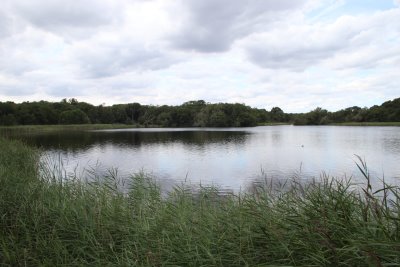Lake

Image Copyright:Jonathan Sayles
Most lakes formed in areas of land where water was able to be captured without the water flowing away in rivers and streams towards the ocean or seas. Tectonic activity, volcanoes, and glaciers have all played a part in creating many of the lakes around the world. The Great lakes in the USA and Canada are glacial lakes. Crater Lake is a volcanic lake. Tectonic lakes form when the land is deformed and one plate slides underneath its neighbouring tectonic plate. The plate going under its neighbour curves downwards which causes an area that can fill with water.
Some lakes are below sea level with the main example being the Dead Sea, which isn`t a sea at all. Its actually 1340 feet 408 metres below sea level and is known as the saltiest body of water on Earth.
There have been some research on the number of lakes in the world by various research bodies and current estimates are over 307 million lakes.
It is thought that the world's smallest lake is Benxi lake in China with a size of 15 square meters. Compare this to the worlds largest lake, the Caspian Sea with an area of 371 thousand square kilometers.
| Lake in other languages:- |
| Cebuano: | danaw |
| Chinese: | hú 湖 |
| French: | m lac |
| German: | m see |
| Greek: | f λίμνη |
| Indonesian: | danau |
| Italian: | m lago |
| Japanese: | mizu-umi 湖 |
| Nederlands: | n meer |
| Norwegian: | m innsjø |
| Polish: | nt jezioro |
| Portuguese: | m lago |
| Spanish: | m lago |
| Swedish: | c sjö |
| Tagalog: | look, lawa |
| Turkish: | göl |